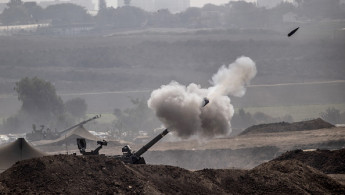Explainer: Has Israel's ground invasion of Gaza started?
With Gaza plunged into darkness and Israel’s indiscriminate bombardment of the besieged Palestinian enclave reaching unprecedented levels of severity, video released by the Israeli military on Saturday has emerged of their forces operating within the strip.
The Israeli military confirmed it is “expanding its ground operations”, which coincided with an overnight assault that included 100 Israeli warplanes assaulting Gaza.
On Saturday morning, it was further established that they had entered northern Gaza overnight with infantry and armoured corps. Israeli military spokesperson Daniel Hagari claimed Israeli forces were still active “in the field”, without elaborating.
Israeli's attempt at a three-pronged attack on the Gaza Strip failed - Hamas
— Verum Reports (@VerumReports) October 28, 2023
Earlier, the IDF showed footage of Israeli tanks operating in the Gaza Strip. Israeli army vehicles seem to operate very close to each other in very clumsy groups. pic.twitter.com/hCYAv7u0v9
Is Israel’s ground invasion of Gaza now underway?
While there’s no doubt Israeli forces are now frequently making incursions into the strip and engaging in ground battles with Hamas and other Palestinian fighters, the Israeli military has not invaded Gaza in the manner in which many expected.
As opposed to launching a full-scale invasion of north Gaza, and engaging in urban warfare with Hamas, Israel seems to be conducting multiple small-scale incursions concentrating in areas around Beit Hanoun on the northern edge of the enclave and immediately to its south.
It could be that these small incursions are essentially Israel “clearing the path” for a larger ground invasion, or it could be that this more focused “small footprint” counterinsurgency is the Israeli tactic going forward.
Why has Israel not fully invaded Gaza?
Though Israel might yet fully invade Gaza, there are some good reasons why it hasn’t done so. For a start, urban warfare is considered to be the most gruelling and deadly form of warfare. Hamas have been preparing for such a war for a long time, while Israel’s conventional army have not.
This is the reason that the US dispatched Marine Corps Lt. Gen James Glynn to advise Israel, given he has major experience of special forces urban warfare against the Islamic State group and also conventional urban warfare in Fallujah during the US occupation of Iraq.
Benjamin Netanyahu’s government is already facing internal criticism for how it has conducted the war and its perceived unpreparedness. The Israeli prime minister is likely to be wary of the fact that a full invasion and large-scale urban warfare would mean mass casualties among the military, which in turn might lead to more domestic hostility to his government.
In this regard, Israel's current strategy might involve employing progressively intense 'shock and awe' air assaults, like the ones recently observed, to reduce resistance to any ground incursions by terrorising the population and attempting to alienate them from Hamas.
What are Israel’s objectives and don’t they necessitate a ground invasion?
Israel has vehemently stated since Hamas’ surprise attack on October 7 that its objectives are to completely eradicate Hamas from Gaza. However, it seems to have dawned on the Israeli political leadership that this would be an impossibility.
Over the course of Israel’s attack on Gaza, the rhetoric has shifted from the complete destruction of Hamas to “destroying its military and governing abilities”, as Netanyahu said in a speech on Wednesday.
Again, while none of this precludes a future full-scale ground invasion from Israel, it accounts for the type of limited incursions we’ve seen from Israeli forces into Gaza.
Israel seems to be seeking to take out Hamas’ infrastructure segment-by-segment, minimising military losses and apparently reducing the military effectiveness of the group.
However, even with these objectives and goals, Israel is far from guaranteed success.
Critics say that everything about Israel’s attack on Gaza, and the approach of its Western allies towards it, such as opposing a ceasefire, completely disregards Palestinian suffering, but also the effect that such suffering will have on the current generation of young Palestinians.
Even from a pro-Israeli perspective, where security of Israel is paramount, some analysts say the trauma that Israel has already inflicted upon Gaza will last for generations and will only entrench the necessity of armed resistance among Palestinians.
A ground invasion would make things even worse. As the Israel-friendly US think tank the Atlantic Council put it:
“[A] ground invasion [combined with] the ongoing decimation of Gaza by air … will lead to the largest humanitarian catastrophe the conflict has seen since 1948.
As a result, Hamas’s self-declared raison d’etre— 'resisting the [Israeli] occupation with all means and methods' —will only grow in the minds of Palestinian youth. This will render unsuccessful Israel’s attempts to eliminate Hamas militarily.”






 Follow the Middle East's top stories in English at The New Arab on Google News
Follow the Middle East's top stories in English at The New Arab on Google News


